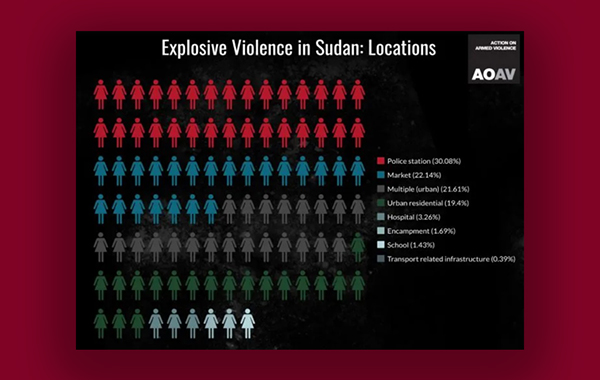
Sudan Ranks Third in Civilian Casualties from Explosive Weapons Globally
moatinoon
Sudan has ranked third in the list of the ten worst countries in terms of civilian deaths globally, according to the latest global report monitoring violence resulting from explosive weapons for the year 2023.
In its annual report for the past year, released on Monday, January 8th, the "Action on Armed Violence" organization stated that Sudan came in third place after Gaza in Palestine and Ukraine on the list of the ten worst countries most affected by civilian casualties from explosive violence, among 64 countries that witnessed explosive violence incidents last year. The list includes, in order, Gaza, Ukraine, Sudan, Myanmar, Syria, Somalia, Pakistan, Yemen, Israel, and Russia.
The report described the situation in Sudan in 2023 as "the most violent year in the organizations records," with a total of 140 explosions, resulting in 2,546 civilian casualties (1,145 deaths and 1,401 injuries). The organization mentioned that these numbers represent a significant difference compared to the year 2022 when the organization recorded three explosive violence incidents and 30 civilian casualties, including five deaths. In 2013, the second-most damaging year for civilians since 2010, the organization documented 16 explosive violence incidents that led to 77 civilian casualties, including 54 fatalities.
The organization added that the Sudanese Armed Forces and the Rapid Support Forces are the main parties in the conflict and the primary perpetrators of harm to civilians. While 61% (86) of the incidents are attributed to unknown or unclear parties, reports indicate that the Sudanese Armed Forces are responsible for 24% (34) of the incidents, resulting in 32% (803) of civilian casualties. The Rapid Support Forces are responsible for 14% (20) of the incidents and 15% (386) of civilian casualties attributed to them.
These numbers do not include human losses resulting from other acts of violence.
Regarding the type of explosives used, the organization stated that 63% (88) of the incidents involved ground-launched explosives, causing 65% (1,655) of civilian casualties in Sudan. Meanwhile, air-launched weapons accounted for 29% (41) of the incidents, resulting in 32% (817) of civilian casualties.
The organization highlighted a significant escalation in the global use of explosive weapons in 2023, especially in populated areas, expressing concern about the substantial increases in the frequency of these incidents and the resulting civilian losses. It stated that what is happening is "a disturbing trend in modern warfare." Sudan has contributed to this scattered increase.
The organization called for an end to the use of explosive weapons in populated areas, considering it an "unacceptable deviation." It described the report as a "stark reminder of the devastating consequences of explosive violence" and called for concerted global efforts to address this challenge. It emphasized the importance of the upcoming international meeting scheduled in Norway in April to review the implementation of the Political Declaration on Strengthening the Protection of Civilians from the Humanitarian Consequences Arising from the Use of Explosive Weapons in Populated Areas, adopted by 83 states in 2022.
Dr. Iain Overton, the organizations Executive Director, commented on the data: "The pervasive and indiscriminate impact of explosive violence, as we’ve seen in 2023, is not just a matter of statistics – it’s a devastating reality that shatters communities and leaves lasting scars on societies. Our data highlights a harrowing trend towards increased civilian harm, emphasizing the need for international action to address the root causes and consequences of such violence. We cannot remain passive observers; we must actively work towards a future where the use of explosive weapons in populated areas is not the norm but an unacceptable aberration."
Katherine Young of the International Network on Explosive Weapons (INEW), of which AOAV is a founding member, said of the findings: "Despite the well-documented risk to civilians, the use of explosive weapons in populated areas continues to be a major cause of civilian harm in contemporary armed conflict, where fighting in urban areas puts civilians at heightened risk of harm. States must refuse to normalize this devastating toll on civilians."

